#sameri
Explore tagged Tumblr posts
Text


Experimenting with a new kind of thing, a few discord server friends had their birthdays so I figured I'd make something for them :3
Haddie DBD on the left and Samarie Funger on the right.
#my art#digital art#artists on tumblr#art#dbd#dbd survivor#dbd fanart#Haddie Kaur#DBD Haddie#Dead By Daylight#Funger#FNH#fear and hunger#Samarie fear and hunger#Samerie Funger
22 notes
·
View notes
Text






Fungertober Part 2: Non Playable Contestants (Non playable for now I hope)
#fear & hunger 2: termina#fungertober#funger#henryk#samerie#august#caligura#paav#tanaka#watercolor#traditional art#sketches
27 notes
·
View notes
Text
OPEN STARTER location ; the market
Fuck this fragile human body!
Yazi spit into the fountain behind him before he turned his full body inward and hugged his knees to his chest. It was just a little blood, but it felt like a huge sign in the direction of the Great Swamp - and the gods beyond - that he was done with being a two-footer. It was stupid and dumb and incredibly uncomfortable.
For one: He hated clothes. They never sat well, they were always in the way, they always got dirty, and sometimes they ripped. He loathed shoes, all to protect toes that literally did nothing but grow nails. He hated facial hair, it was itchy, and it was always growing. He had to shave his face every few days to stop it from itching, and the worst part was: he loathed skin. It was too fragile, it ripped quickly, it bled quickly, it hurt quickly. He had no idea how fragile skinned two-footers survived this long.
He licked his split lip and held a piece of his linen shirt against the cut on his chin. He knew he had more injuries, and his Witch was nowhere in sight. Not that they would be able to heal those with a shake of their hand, but they could at least give them a kiss and him a pet on the head and he could yell at them for making him a human in the first place.
Instead, he had to find his own way home.
He lifted a foot and set it down gentle on the gravel before him, then leaned into it, before flinging it back with a yelp.
If only he was a Pandok, he could've flown, or gotten home on three legs. But two-footers were useless in this case.
Annoyed and probably hissing - as a Pandok does - Yazi pointed at the first individual to appear in his vicinity. "You! You seem like a good sameri-something, help a croc out, I can't stand on both legs at the moment!" This usually worked for his Witch, but he was certain they were using charm when they requested someone's aid.
33 notes
·
View notes
Text
Kinktober Day 16: Public with Johnny Silverhand
Pairing: Johnny Silverhand x Fem!Reader Word Count: 971 Warnings: Sex is a public restroom, Oral sex (F receiving), Vaginal fingering, P in V sex, No Aftercare. Kinktober Master(sub)list.
Minors DNI
Johnny Silverhand is a lot of things. Brash, arrogant, egotistical. But if there’s one thing he’s not, it’s patient.
Which is why he has you pressed against the wall of a bathroom stall at one of Sameri’s venues after a show, couldn’t even wait long enough to go back to his dressing room. Hell, you had to guide him mid lip lock because he was prepared to fuck you right there on the stage stairs in front of God and everybody.
His beard scratched at your face as his lips claimed yours, rough presses mixed with teeth and chaotic tongues. He kissed you like he was starving, and you were a feast.
Equally rough hands roamed your body, unable to stay in one place long before they were migrating to the next point of interest. Tits to waist, waist to hips, hips to ass, and right back to the beginning again, squeezing and massaging as he went. But not touching where you actually wanted him.
“Fuck, Johnny. Such a rush but you’re not even getting to it…” You grumbled, hiking your miniskirt up over your hips. “Touch me or fuck off.”
He let out a scoffing chuckle, smirk plastered on his face like he’d won something, and dropped to his knees. “Pushy, pushy...” He said before kissing and biting his way up your thigh till he reached you panties, which he wasted no time tugging aside so he could run his tongue through your folds, moaning at the taste at the same time you moaned at the feeling.
“Wouldn’t push…” You let out a gasp as he latched onto your clit to give it a suck, the tip of his tongue brushing over it in circles. “If you’d stop making me wait.” Your fingers curled into his hair, pushing it back from his face so you could see what he was doing, the way his face began to glisten with your juices.
“Mmhmm…” He hummed against you, making your back arch as the vibrations ran up your spine, and before you can think he’s got two fingers pressing into you, metal hand holding your thigh up, so he has unimpeded access.
How a man as cocky as Johnny actually knows what he’s doing will never cease to baffle you. Most men who act like him can’t even find the clit, let alone know how to bring a woman to orgasm using it and the g-spot in a perfect synchronous rhythm.
And yet that’s exactly what he does. Drives you up and over that peak of pleasure and makes you shake against the wall, the stall rattling slightly from the movement, as you cry out his name like a prayer.
But just as before, he lacks the patience to let you come down even slightly before he’s back on his feet, turning you around and bending you over with one hand while the other opens the front of his pants, pulling out the thick cock that you wouldn’t admit to anyone that you dream about, least of all Johnny.
“Hold on, Sweetheart.” The nickname is sarcastic, a holdout from the first time the two of you fucked, you’d called him ‘Pretty boy’ and he’d snipped back and called you ‘Sweetheart’ and that’s been that ever since.
Before you could snap back you were gasping at the stretch as he pushed into you, filling you to the brim with a sweet burn that made you clench around him, pulling a sound from between his clenched teeth.
There was no moment of calm, no waiting for you to adjust before Johnny started moving, hands gripping your hips and pulling you back into him with every thrust, driving himself into you at a punishing pace that made you cry out in ecstasy, begging him not to stop between moans and choked gasps.
The thick tip of his cock battered against your cervix over and over again, diving your whole body forward into the filthy graffitied wall before dragging you right back against him a second later, it would knock you off balance if he didn’t have most of your body weight under his control.
“Fuck…” He growled. “Pussy’s always so goddammed tight…” He sounds almost ragged, breathing heavy and voice tight, he must be getting close.
That thought is quickly confirmed as he reaches around you with his flesh hand to rub tight fast circles into your clit, making you jump and tighten around him even more with a sharp gasp. You would have reached down to grip his forearm if you thought you wouldn’t fall over during so.
“Johnny…” You gasped as you felt the telltale tightening in your belly. “Shit! Close…Fuck, so close…” Your voice is embarrassingly high, the only saving grace is that anyone listening in could hardly blame you considering who’s fucking you so good.
You can almost hear his smirk as he leans down to suck and bite at your neck and shoulder, that final bit of sensation he knew you needed to get there, and it would have pissed you off that he knew you that well, if it didn’t work so damn well.
Your words had barely stopped echoing before you were wracked with another mind-numbing orgasm, body locked up as your muscles clenched and he came a second later, a low sound like a growl mixed with a sigh falling from between his lips.
He held you up just long enough for both of you to regain your breaths, and braincells, then he was pulling out and stuffing his softening dick back into his pants. “Until next time, Sweetheart.” He said before turning to leave.
“Til then, Pretty boy.” You sighed back, not bothering to watch him go as you wiped yourself clean, already anticipating when you’d have him again.
29 notes
·
View notes
Note
I love how much you and Natalie just really enjoy each other. I follow you both and have for years so I see these gimpses you two make public of just actual joy in eachother and I'm just so happy for you both. I know your little family is bigger than just you two, but I don't know the details, and they aren't my business. But it's very clear you have a lot of love in your life and you so deeply deserve it! Anyway, I'm going to wander off now, but your sameri jack thread is just really happy! Sorry if this is weird.
Oh gosh, this is so sweet! Thank you! <3
23 notes
·
View notes
Text
🍃🕊🍃 Korah’s (Qarun) Ruin
Surah Al-Qasas - Verse 76
إِنَّ قَارُونَ كَانَ مِن قَوْمِ مُوسَي فَبَغَي عَلَيْهِمْ وءَاتَيْنَاهُ مِنَ الْكُنُوزِ مَآ إِنَّ مَفَاتِحَهُ لَتَنُوأُ بِالْعُصْبَةِ اُوْلِي الْقُوَّةِ إِذْ قَالَ لَهُ قَوْمُهُ لا تَفْرَحْ إِنَّ اللَّهَ لا يُحِبُّ الْفَرِحِينَ
“Verily Korah was of the people of Moses, but he oppressed them; and We had given him of the treasures so much that its keys would have been a burden to a company of men endowed with strength. Once his people said to him: ‘Do not exult, for Allah does not love the exultant’.”
Mentioning the historical examples is a gazing-stock for the coming generations.
Having a good background is not a proof for being good in the future or renunciation of the present deviations.
The wonderful story life of Moses (as) and his struggle against Pharaoh was explained in a part of former verses of this Surah, and what had to be said about them was stated sufficiently.
In another part of the verses of this Surah, the struggle of the Children of Israel against a rich arrogant man among them called Korah is referred to. He was a wealthy man who was the manifestation of wealth accompanied with pride, deceit, and contumacy.
In principle, during his lifetime, Moses (as) struggled against three important oppressive tyrannical powers: Pharaoh, who was the sample of governmental power, Korah, who was the manifestation of wealth, and Sameri, who was the example of art, deceit, and elusion.
Although the most important struggle of Moses (as) was against the governmental power, the recent two struggles have importance for themselves and contain some great instructive lessons.
It is said that Korah was a close relative of Moses (as), (his cousin (son of a paternal uncle), or uncle, or son of his maternal aunt); and, from the point of information, he had a considerable knowledge about the matters of Torah.
At first he was one of the believers, but, later, pride and wealth drew him towards disbelief and sent him into the depth of the ground, made him fight against the messenger of Allah, and his amazing death became a lesson for all. The explanation of this event will be discussed later in the concerning verse.
The Quran says:
“Verily Korah was of the people of Moses, but he oppressed them…”
The cause of this oppression and disobedience was that he had obtained a great deal of wealth, and since he had not enough capacity and strong faith, this abundant wealth deceived him and drew him towards deviation and arrogance.
The Quran continues saying:
“…and We had given him of the treasures so much that its keys would have been a burden to a company of men endowed with strength…”
The Arabic word /mafatih/ is the plural form of /maftah/ in the sense of ‘a place wherein something is stored’, like the chests that properties are stored up in them.
Thus, the concept of the verse is that Korah had so much gold, silver and precious properties that a group of strong men could move its box with difficulty.
And, regarding that the Arabic word/‘usbah/ means a body of men (from ten to forty) who are with together and are strong enough and they have held each other like nerves, makes it clear that how heavy the jewels and precious properties of Korah had been.
The term /tanu’/ is derived from /nu’/ which means: to raise with difficulty and heavily, and it is used for a heavy burden that when a man is carrying it, because of heaviness, it causes him to sway this side and that side.
What was said in the above about the Arabic term /mafatih/ is something that a very large group of commentators and lexicologists have accepted, while some other commentators have said that the term /mafatih/ is the plural form of /miftah/ which means key. They say that the keys of the treasures of Korah were so heavy that several strong men could carry them with difficulty.
Those who have chosen this meaning have got in trouble to themselves to adjust it that how it is possible to be so many keys of treasures, and, however, the first commentary is more clear and more correct.
Now, it is better to see what the Children of Israel told Korah. The Holy Quran implicitly says: remember when his people told him not to have so much joy flourished with pride, negligence and arrogance, because Allah does not like the proud exultant.
The verse says:
“…Once his people said to him: ‘Do not exult, for Allah does not love the exultant’.”
Surah Al-Qasas
(verse 77)
وَابْتَغِ فِيمَآ ءَاتَاكَ اللَّهُ الدَّارَ الاَخِرَةَ وَلا تَنسَ نَصِيبَكَ مِنَ الدُّنْيَا وَأَحْسِن كَمَآ أَحْسَنَ اللَّهُ إِلَيْكَ وَلا تَبْغِ الْفَسَادَ فِي الاَرْضِ إِنَّ اللَّهَ لا يُحِبُّ الْمُفْسِدِينَ
“And seek by means of what Allah has given you, the abode of the Hereafter, and do not forget your portion in this world, and be good (to others) just as Allah has been good to you, and do not seek to make mischief in the land, verily Allah does not love the mischief-makers.”
Every body ought to suffice to his own share in this world and let the rest for Hereafter. Wealth and property can become a means for the prosperity in Hereafter.
In this verse, next to the advice mentioned in the previous holy verse, there are four other expressive and instructive exhortations here for Korah which form a complete five-ring collection.
At first, it says:
“And seek by means of what Allah has given you, the abode of the Hereafter…”
It points to the fact that, in spite of the imagination of some ill-disposed persons, wealth and property is not a bad thing; the important thing is that we must see in which way it is used. If it is applied in the way of seeking the good abode of the Hereafter, what is better than that? If it is a mean of pride, negligence, injustice, oppression, and sensuality, what, then, can be worse than it?
This is the same logic that Amir-ul-Mu’minin Ali’s (as) famous sentence reminds about the world.
He said:
“…If one sees through it (the world), it would bestow him sight, but if one has his eye on it, it would blind him.”1
And Korah was a person who had the power of performing a lot of social good affairs with those abundant properties he had; what was use of it when his pride did not let him see the facts?
By the second advice, it is added that he should decrease his portion from this world: the verse says:
“…and do not forget your portion in this world…”
This is a fact that every person has a proper limit share of this world, viz., the amount of properties he uses for his body, clothing, and residence is a definite amount, and the additional ones are never consumed by him; therefore, one must not forget this fact.
How much food can a person eat? How many pieces of clothing can he wear? How many houses and how many cars can he have? And how many shrouds does he take with him when he dies? The rest, however, is the share of others and man is the depositary of them.
How nice Hadrat Amir-ul-Mu’minin Ali (as) stated when he said:
“O’ son of Adam! Whatever you earn beyond your basic needs you will only keep vigil over it for others.”2
There is another interpretation upon the abovementioned sentence cited in Islamic narrations and the statements of the commentators which adapts to the above interpretation and, perhaps, both of them are its purpose.
It is that Ma‘any-ul-’Akhbar, narrates from Amir-ul-Mu’minin Ali (as) who upon the commentary of the Qur’anic sentence:
“…do not forget your portion in this world…”
said:
“Do not forget your health and strength, and your opportunity, and your youth, and your mirth, and by means of these (five bounties) seek out the Hereafter.”3
According to this commentary of the holy verse, the abovementioned statement is a warning to all human beings that they should not lose the opportunities and capitals, because they pass on like cloud.
The third advice is as follows:
“…and be good (to others) just as Allah has been good to you…”
This is also a fact that one must always expect the good of Allah and ask for any kind of goodness and all kinds of expectation from Him. In this condition, how can he ignore the explicit demand of others and pass by all of these clear things inattentively?
In other words, as Allah has bestowed them to you, you ought to bestow (some of them) to others. A similar meaning to this is mentioned in Surah An-Nur, (no. 24, verse 22) in connection with forgiveness and remittal.
It says:
“…And they should pardon and overlook. Do you not like that Allah should forgive you?…”
This sentence can be rendered like this that sometimes Allah gives man some great bounties so that he does not need them all in his personal life. Allah gives him a powerful wisdom which is useful not only for running a person but also for running a country.
He gives him knowledge that not only an individual but also a society can take benefit from it. He gives him a wealth which is appropriate for great social programs.
The implication of these kinds of Divine merits is that the totality of them does not belong to you, but you are the agent of Allah in giving them to others. Allah has bestowed this merit on you that He manages His servants by your hand.
Finally, the fourth advice is as follows:
“…and do not seek to make mischief in the land, verily Allah does not love the mischief-makers.”
This is also a fact that many of the faithless rich people, sometimes as the result of the madness of avariciousness and sometimes because of self-superiority, commit mischief and draw the society into deprivation and poverty.
They usually take everything in their own authority. They wish people to be some servants and slaves for them, and whoever protests they try to destroy him, and if they cannot, they desert him through slander by means of their secret agents. Thus, they draw the society towards corruption and decadence.
Now it is understood that these advisers tried, at first, to break the pride of Korah.
In the second stage, they warned him that the world is a means, not an aim.
In the third stage, they warned him that he could use only a small part of what he had.
In the fourth stage, they reminded him this fact that he should not forget Allah had been good to him, then he had to be good to others either, else his merits would be taken from him.
In the fifth stage, they told him to avoid making mischief in the earth, which is the direct result of former four principles.
It is not completely definite that who these exhorters were but it is certain that they were some knowledgeable, pious, aware, exact, and brave men.
Some commentators have thought that probably Moses (as) himself did it but it is very improbable, because the Quran in previous verse says:
“…When his people said to him…”.
Surah Al-Qasas
(verse 78)
قَالَ إِنَّمَآ اُوتِيتُهُ عَلَي عِلْمٍ عِندِي أَوَلَمْ يَعْلَمْ أَنَّ اللَّهَ قَدْ أَهْلَكَ مِن قَبْلِهِ مِنَ الْقُرُونِ مَنْ هُوَ أَشَدُّ مِنْهُ قُوَّةً وَأَكْثَرُ جَمْعاً وَلا يُسْأَلُ عَن ذُنُوبِهِمُ الْمُـجْرِمُونَ
“Said he (Korah): ‘I have been given this (wealth) only because of a knowledge that is in me.’ Did he not know that Allah had destroyed before him of the generations that were mightier in strength than he and greater in amassing (wealth)? And (then even) the guilty shall not be asked about their sins.”
To boast for one’s knowledge is a manner of people like Korah.
The pride for having knowledge changes man so selfish that he accepts the function of no one and nothing any more:
“…‘I have been given this (wealth) only because of a knowledge that is in me’…”
We must think of wealth and power as Divine bounties, not the fruit of our own knowledge and effort.
With that very state of pride and haughtiness, which originates from his abundant wealth, Korah used to say as the Quran announces:
“Said he (Korah): ‘I have been given this (wealth) only because of a knowledge that is in me.’…”
Korah used to say implicitly that it was not their business that what he did with his wealth. He said he did not need any one to guide him how to use his wealth, because he himself obtained it with his own knowledge and awareness.
Moreover, Korah implicitly added that certainly Allah knew him eligible of having wealth that He had given it to him and He had also taught him the way of using it. Then, he said, he knew better than others what to do, and it was not necessary that they interfere in his affairs.
Besides all of these, I have taken trouble, tolerated pains, and was deeply afflicted in order to gather this wealth; why do they not also take trouble if they have eligibility and ability? I am not bothering them; and if they are poor, it is the better that they remain hungry until they die.
These are the decade and disgrace logics that many faithless wealthy people often express in reply to those who advise them.
This point is also worthy noting that the Qur’an has left this matter secret that in obtaining this wealth to which knowledge of his does Korah emphasize?
Is it the knowledge of alchemy, as some commentators have said?
Is it the knowledge of commerce, agriculture, and the arts of industry?
Or is it his special administration by which he could obtain that enormous wealth? Or it refers to all of them?
It is not improbable that the verse has a vast meaning and encompasses all of these things.
(It is not known, of course, that the knowledge of alchemy, the knowledge by which gold is made from copper and the like, is a fable or a reality.)
Here, the Quran gives a harsh answer to Korah and others like him.
It says:
“…Did he not know that Allah had destroyed before him of the generations that were mightier in strength than he and greater in amassing (wealth)?…”
Korah says that whatever he has is by means of knowledge, but he has forgotten that there were many persons who were more knowledgeable, stronger and wealthier than him while they could not escape from the punishment of Allah.
The fair- minded ones of the Children of Israel had told Korah that it was Allah Who had given him that wealth but this impolite and bold man answered them:
“…‘I have been given this (wealth) only because of a knowledge that is in me’…”,
while Allah, in the above verse, manifests his strength in the fact of His Will.
At the end of the verse, he is warned again by a very short sentence, where it says:
“…And (then even) the guilty shall not be asked about their sins.”
In principle, there will not be any time for asking and answering. It is a decisive, painful, violent and sudden divine punishment.
That is, today the aware men of the Children of Israel advise Korah and give him respite to contemplate and give answer, but when the argument is completed and the Divine punishment comes, surely there will not be any respite for contemplation or uttering some vain and haughty words. As soon as the Divine punishment comes, they will be destroyed.
There will arise a question here inquiring that what is the objective of the question that the guilty are negated from? Is it in this world or in the next world?
Some of the commentators have chosen the first one while some others have taken the second, and there is no matter that both of them to be the objective of it; i.e. neither they will be asked in the world at the time of sudden punishment so that they bring some excuses and count them faultless, nor in the Hereafter, because in that place everything is manifest and as the Quran says:
“The guilty ones shall be recognized by their marks…”4
Thus the verse under discussion is consistent with the verse which says:
“And on that Day neither man nor jinn shall be asked about his sin.”5
There comes forth another question here which is not consistent with the holy verse that says:
“So, by your Lord, We shall surely question them all (in the Hereafter),”6
This question can also be answered in two forms: the first is that there are different places of standing in the Hereafter. In some of them the guilty are questioned while in some others every thing is clear and there is no need of questioning.
Another thing is that question is of two kinds: the question of investigation, and the question of blame. In the Hereafter there is no need of ‘the question of investigation’, because all things are manifest, but the reproach question is found there and this is a kind of punishment for the guilty.
It is just like the question that the father asks from his degenerate son and says:
“Did I not serve you so much? And was the recompense of those service treachery and corruption?”
(While both of them are aware of the affairs and the purpose of the father is to blame the son.)
Surah Al-Qasas
(verse 79)
فَخَرَجَ عَلَي قَوْمِهِ فِي زِينَتِهِ قَالَ الَّذِينَ يُرِيدُونَ الْحَيَاةَ الدُّنْيَا يَالَيْتَ لَنَا مِثْلَ مَآ اُوتِيَ قَارُونُ إِنَّهُ لَذُو حَظٍّ عَظِيمٍ
“So he went forth unto his people in his adornment. Those who aspired for the life of this world said: ‘We wish we had like what Korah has been given! Verily he owns a great fortune’.”
When the power and wealth are in the hand of some negligent persons and they are the cause of boasting, gaudiness, and luxury; and showing the wealth and property to others boastingly, this manner is one of the qualities of Korah.
The boastful wealthy persons usually afflict with kinds of madness, one branch of which is ‘the madness of exhibiting wealth’. They take pleasure to show their own wealth to others. They feel peace of mind when they ride a good precious mount and pass through the crowd of the poor while, by making dust unto their faces, they despise them.
This showing wealth is often a calamity for their lives, because it fosters grudge in people’s hearts.
This evil action may have a motive such as: ‘Allurement of covetous persons’ and the like, but they do this deed even without this motive. This is a kind of desire, not a program and plan.
However, Korah was not an exception from this law, but he was considered as a clear example of it. The Quran has stated it a sentence in this verse.
It says:
“So he went forth unto his people in his adornment…”
The application of the Arabic word /fi/ (in) in the phrase: ‘in his adornment’ expresses this fact that he used all his own ability and power in order to show his final adornment and his ultimate wealth, and with no words, it is clear that how large activities he can do by this wealth.
Of course, there are many stories or legends cited in history upon this field which are not necessary to be mentioned.
But, as usual, here people were divided into two groups: 1) The majority of people who were some mammonish persons and when they saw that gazing scene, their hearts shook, and gasped moaning, and they wished they could be in the place of Korah, even for one day, or one hour, or one moment.
They thought what a sweet and attractive life they could have, and how a happy and pleasant world it were for them!
The Quran says:
“…Those who aspired for the life of this world said: ‘We wish we had like what Korah has been given! Verily he owns a great fortune’.”
They said that praise be upon Korah and upon his abundant wealth! What a rank and grandeur! And what a glory it is that history does not contain anything similar to that! This is a God-given glory…and some statements like them.
In fact, here the furnace of the trial of Allah became hot. From one side, Korah is in the middle of the furnace and he has to be examined for his arrogance; and, on the other side, the mammonists of the Children of Israel are around this furnace.
The painful punishment, of course, is the punishment that exists after such an exhibition and from that height he falls down into the depth of the ground.
Surah Al-Qasas
(verse 80)
وَقَالَ الَّذِينَ اُوتُوا الْعِلْمَ وَيْلَكُمْ ثَوَابُ ال��َّهِ خَيْرٌ لِمَنْ ءَامَنَ وَعَمِلَ صَالِحاً وَلا يُلَقَّاهَآ إِلاَّ الصَّابِرُونَ
“And those who were given (true) knowledge said: ‘Woe to you! Allah’s reward is better for him who believes and acts righteously, and none shall attain it save the patient’.”
The real knowledge draws man towards Hereafter, piety, and righteous deed. An aware learned man is he whom the dazzling glare of the world might not attract, and his manner can advise the mammonist ones and affect them.
However, besides this large group of mammonist, whom were referred to in the previous verse, there were also several learned, thoughtful, pious, and faithful people present there whose level of thought was above and superior than these affairs.
Those were some men who did not estimate the personality of their people with the criterion of gold and force. They were those who did not seek the values in the material potentialities, and always used to laugh at these kinds of exhibitions mockingly, and belittled these empty minds.
Yes, a group of such men attended there, as the Quran says:
“And those who were given (true) knowledge said: ‘Woe to you! Allah’s reward is better for him who believes and acts righteously…”
Then, they added:
“…and none shall attain it save the patient’.”
Those who prove steadfastness against exiting dazzling glare of the ornaments of the world; those who stand firm like mountains in the Divine trials for wealth, property, fear, and calamity, yes these ones are eligible for the Divine rewards.
It is certain that the purpose of the Quranic phrase:
“Those who were given (true) knowledge”
is the faithful learned men of the Children of Israel among whom there were some great men such as ‘Yusha‘’.
It is interesting that against the Quranic sentence:
“Those who aspired for the life of this world”,
mentioned in the previous verse, about the first group, the Quran does not apply the sentence:
“Those who aspired for the life of Hereafter”,
but it emphasizes only on ‘knowledge’, because ‘knowledge’ is the main origin and root of faith, steadfastness, eager and love to the Divine reward, and the abode of Hereafter.
By the way, the application of the sentence:
“Those who were given (true) knowledge”
is a severe answer to Korah who considered himself a knowledgeable one. The Quran implies that these are true knowledgeable whose level of thought is very high, not the arrogant, obstinate and proud Korah. Thus, we see that the origin and root of all blessings and bounties returns to real knowledge.
Surah Al-Qasas
(verse 81)
فَخَسَفْنَا بِهِ وَبِدَارِهِ الاَرْضَ فَمَا كَانَ لَهُ مِن فِئَةٍ يَنصُرُونَهُ مِن دُونِ اللَّهِ وَمَا كَانَ مِنَ الْمُنتَصِرِينَ
“And We caused the earth to swallow up him and his house, then for him there was no group to help him against (the wrath of) Allah, nor could he defend himself.”
Man can spiritually move alongside two curves: toward upward that he reaches ascension and toward downward that he goes down deeply into the lowliness.
The final end of amassing wealth is often miser, pride and destruction.
By this action, Korah caused his disobedience to reach its climax, but regarding this matter there has been recorded in history and narrations another event that is the sign of Korah’s ultimate impudence, it is as follows:
One day Moses (as) told Korah that Allah had commanded Moses to take the right of the needy (Zakat) of his property. Then Korah with a simple calculation understood how great amount of money he had to pay in this way. He refused it, and in order to exonerate himself, he struggled against Moses (as).
Once he stood among a rich group of the Children of Israel and said:
“O people! Moses has intended to devour your properties. He brought the command of prayer and you accepted it; you accepted all other things, too; do you also bear to give him your property?”
They said:
“No. But how can we stand against him?”
Here, Korah thought of a Satanic action. He said:
“I have thought a very good way for it. In my opinion, we must produce a file of the act of indecency for him. We must send for a bad woman among the prostitutes of the Children of Israel and tell her to go to Moses and accuse him that he had a liaison with her.”
They approved it and sent for that kind of woman and told her whatever she demanded they would give her for the act that she might attest that Moses had a liaison with her. The woman accepted that suggestion.
This was from one side, on the other side Korah went to Moses (as) and said it was better that he (as) would gather the Children of Israel and recite the commands of Allah for them. Moses (as) accepted it and gathered them in one place.
People said to Moses to reiterate the ordinances of his Lord. Moses said that He had commanded him that they should not worship any one other than Him, they should regard for kinship, and do so and so; and in regard for an adulterer He has ordered that if it was an adultery (fornication with a married one) he had to be stoned.
At this time, those rich people of the Children of Israel who had conspired said:
“Even if that man is you yourself!”
He (as) answered:
“Yes, if it is I myself.”
Here, they made their shamelessness that reached its climax and said:
“We know that you have committed this action yourself and you have associated with that woman who is a prostitute.”
Then, they immediately sent after that particular bad woman and told her to say her attestation. Moses addressed her and said:
“I administer you an oath by Allah to say the reality clearly.”
By hearing this statement, the bad woman shook severely, trembled and was touched at heart. She said:
“Now that you say so I tell the truth manifestly. These people invited me and promised to pay me a heavy reward that I accuse you; but I bear witness that you are pure and you are the messenger of Allah.”
Another narration indicates that that woman said:
“Woe on me! I have committed many wrong actions, but I have not denigrated the messenger of Allah.”
Then she showed the two purses of money that they had given her and said whatever was to say.
Moses (as) fell prostrated and wept, and it was then that the command of the punishment of Korah, the evildoer, was issued.
This very narration denotes that Allah gave the command of /xasf/ (swallow) at Moses disposal.7
In this regard, the Quran says:
“And We caused the earth to swallow up him and his house…”
Yes, when inordinacy contumacy and humiliation of the poor believers, as well as plotting against the pure messenger of Allah, reaches its peak, the Power of Allah works and puts an end to the life of the plotters. It destroys them so severely that their life becomes a gazing-stock for all.
The act of /xasf/, which here means: to sink, and being concealed into the earth, has happened many times during the history of man. It occurs when a horrible earthquake comes and the ground splits and swallows a city or some villages. But this one was different with other instances. Its main prey was only Korah, his house, and his treasures.
Strange! Pharaoh sinks in the waves of Nile; Korah sinks in the depth of the ground; water, which is the source of life, is commissioned to destroy the people of Pharaoh; and the ground, which is the place of comfort, becomes the graveyard of Korah and Korah-like people.
It is certain that Korah was not the only inhabitant of that house. It was he and his entourage; he and his confederates, he and his unjust cruel friends. All of those people sank into the depth of the ground.
The verse continues saying:
“…then for him there was no group to help him against (the wrath of) Allah, nor could he defend himself.”
Neither those who received rations from him, nor his loyal friends, nor his wealth and properties, could save him from the Divine punishment, and all of them sank into the ground.
Surah Al-Qasas
(verse 82)
وَأَصْبَحَ الَّذِينَ تَمَنَّوْا مَكَانَهُ بِالاَمْسِ يَقُولُونَ وَيْكَأَنَّ اللَّهَ يَبْسُطُ الرِّزْقَ لِمَن يَشَآءُ مِنْ عِبَادِهِ وَيَقْدِرُ لَوْلآ أَن مَنَّ اللَّهُ عَلَيْنَا لَخَسَفَ بِنَا وَيْكَأَنَّهُ لا يُفْلِحُ الْكَافِرُونَ
“And (by seeing Korah’s annihilation) those who yearned for his position the day before were saying: ‘Ah! That Allah enlarges the sustenance for whomever He pleases, of His servants, or restricts it. Had not Allah been gracious to us, He might have made the earth swallow us, too. Ah! (know) that the unbelievers do not prosper’.”
Sometimes it happens that a supplication is not accepted or a desire is not obtained, and this very thing is the greatest grace and favour of Allah upon man.
This noble verse illustrates the surprising change of the spectators who yesterday were enraptured and rejoiced by seeing the glorious rank of Korah and desired that they were in his place forever, or at least, for a moment. This scene is, indeed, wonderful and instructive.
The verse says:
“And (by seeing Korah’s annihilation) those who yearned for his position the day before were saying: ‘Ah! That Allah enlarges the sustenance for whomever He pleases, of His servants, or restricts it…”
They said that it was proved for them that day that no one has anything from him and whatever exists is from the side of Allah. Neither His grant is the reason of His consent and pleasure from a person, nor his restriction is the reason for the absence of his value before the presence of Allah.
It is by means of these very properties that He puts individuals and nations under examination and makes their conducts and morals manifest.
Then, they thought that if Allah accepted their invocation and put them in the place of Korah yesterday, what could they do that day?
Therefore, they decided to thank for that bounty of Allah and said:
“…Had not Allah been gracious to us, He might have made the earth swallow us, too…”
“…Ah! (know) that the unbelievers do not prosper’.”
Now we see the truth with our own eyes and understand the result of pride and negligence as well as the end of disbelief and lust. We also realize that how terrible these kinds of lives are which have a charming landscape!
By the way, it is understood from the recent sentence of this story that the end of proud Korah was that he died with infidelity and faithlessness, though one day he was in the row of the readers of Torah and was counted among the learned men of the Children of Israel, and he was one of the close relatives of Moses (as).
Some points
The story of Korah, the sample of a proud rich man, has been stated in the Quran through seven verses in a very interesting way, and it removes the curtain from the facts of many lives of human beings.
This story makes it clear that the pride and lust of wealth sometimes draws man towards kinds of madness; the madness of exhibiting the wealth and showing it to others, and the madness of taking delight from despising the poor.
And also the same pride and unlimited love to gold and silver sometimes causes man to commit the most hideous and shameful sins. For example, he stands against the pure prophet of Allah, and struggles against the Truth, and even he charges the most shameless accusations to the most sincere men, and he may even use of his wealth in taking from some bad women to reach his aim.
Pride originated from wealth usually does not let man to hearken the advice of some godly advisers and the benevolent statements.
They have provided this imaginary splendid life while in their city, and sometimes on their close neighbourhood, there are some deprived persons who usually sleep hungry at night; and it is surprising that their conscience has become so feeble that they do not feel the least inconvenience from this painful situation.
Sometimes their animals have the most comfortable life, and they enjoy even the existence of teacher, physician, and proper medicine while there are some oppressed people living in their neighbourhood who have the worst conditions of life; or they are sick, moaning in the bed because of pain while they have neither a physician nor any medicine.
When we discuss these affairs about some particular persons in a society, and sometimes about a particular country, it means that it is a country as that of Korah opposite to other countries, of the world, as we see, in our time, about America and many counties of Europe.
They have provided the most glorious life for themselves by exploitation of the people of the third world and those of poor countries, so that sometimes their extra food stuffs are wasted and if they were gathered in a correct way, they would be enough to satiate millions of hungry men. Sometimes they even pour their extra wheat into the sea.
When we say ‘poor countries’ it does not mean that they are really poor, but they are, in fact, some thief-stricken and robbed people. Sometimes the best and the most valuable mains are in their disposal, but these great plunders take all of those precious capitals and cause them to be poor.
These are some people with qualities of Korah who have built the foundation of their castles of cruelty upon the ruin houses of the oppressed; and the situation of the world will be in the same form unless the oppressed of the world unite and send them, like Korah, to the depth of the ground. Those oppressors drink wine and laugh joyfully while these oppressed ones must always be sad and do weep.
Of course, it must not be considered from what was said that Islam has a negative position in the face of wealth and opposes it. It must not be understood that Islam admires the poor and invites Muslims to poverty or takes it as a means for reaching the spiritual accomplishments.
On the contrary, Islam emphasizes on wealth as an effective means, and in Surah Al-Baqarah, No. 2, verse 180 wealth has been rendered into /xayr/ (goodness).
Imam al-Baqir (as) has said:
“The world is a good help for obtaining the Hereafter.”8
The verses under discussion, which reproach the proud rich Korah the most severely, is an expressive evidence for this subject; but Islam approves a wealth by which the abode of Hereafter can be sought, as the learned men of the Children of Israel told Korah:
“And seek by means of what Allah has given you, the abode of the Hereafter…”9.
Islam approves a wealth in which there is good unto all and it contains the meaning of:
“…be good (to others) just as Allah has been good to you…”10
Islam admires a wealth in which this meaning is seen that the Qur’an says:
“…and so not forget your portion in this world…”11
Finally, Islam seeks for a wealth which is not the cause of mischief on the earth, forgetting the human values, being involved in the race of amassing wealth and ‘multiplication of properties and children,’ and does not draw man toward ‘self-admiration’ and ‘humiliating others’, and even opposing the Divine prophets.
Wealth must be a means for the benefit of others, for filling the present economic gaps, for using as a remedy upon the worrying wounds of the deprived and applying for removing the needs and difficulties of the oppressed.
Being interested in such a wealth, with such aims, it is not an attachment to the world; it is an attachment to the Hereafter. As it is said in a tradition that one of the companions of Imam Sadiq (as) came to him and said as a grievance that they were after the world and were interested in it, (and they were afraid of becoming mammonists).
Imam al-Sadiq (as) (who knew the purity and virtue of that man) said:
“What do you want to do with this wealth of the world?”
The man answered:
“I want to supply the expenditure of myself and my household, help my relatives, spend in the way of Allah, and perform pilgrimage (Hajj) and lesser pilgrimage (‘Umrah).”
Imam al-Sadiq (as) said:
“This is not to seek the world, this is to seek the Hereafter.”
Here, the corruption of the belief of two groups is made manifest: a group of people who are apparently Muslims but they are unaware of the teachings of Islam and introduce Islam as the supporter of the tyrant oppressors; and a group of self-interested enemies who want to show the feature of Islam wrongly and try to introduce it as a religion opposite to wealth and adherent of poverty.
They want to say in principle, a poor nation cannot live freely and honourably; poverty is the means of dependence; poverty is the source of disgrace both in this world and the next; and poverty invites man to sin and pollution.
A tradition from Imam al-Sadiq (as) says:
“The needlessness that hinders you from injustice (and violating others’ right) is better than the poverty that makes you commit sin.”12
The Islamic communities must try and do their best to become rich and needless from others (none Islamic nations), so much that they become independent and stand on their own feet. As the result of poverty, they must not devote their modesty, honour and independence for depending on others, and know that this is the noble line of Islam.
≿━━━━༺❀༻━━━━≾
🍃🕊🍃 Sources 🍃🕊🍃
1. Nahjal Balagha, (sermon 82)
2. Nahjal Balagha, (saying 192)
3. Ma‘aniy-ul-’Akhbar,
narrated by Nur-uth-Thaqalayn,
(vol. 4, pg. 139)
4. Surah Ar-Rahman, (no. 55, verse 41)
5. Ibid, (verse 39)
6. Surah Al-Hijr, (no. 15, verse 92)
7. Durr-ul-Manthur, Tafsir-i-Al-Mizan,
(vol. 16, pg. 84)
8. Wasa’il-ush-Shi‘ah, (vol. 12, pg. 17)
9. The current Surah, (verse 77)
10. Ibid
11. Ibid
12. Wasa’il-ush-Shi‘ah, (vol. 12, pg. 17)
≿━━━━༺❀༻━━━━≾
🍃🕊🍃 al-Islam.org 🍃🕊🍃
.

#ahlulbayt#islam and shia#imam hussain#imam mahdi#fatima#imam ali#prophet muhammad#ahlulbait#fatima zahra#imam husayn
2 notes
·
View notes
Text
Samurai Inspired Sample making
This is another development of creating my samurai inspired sample. Here is where I was experimenting to create the buttons on the samurai armour. I started off by making a puff 3D effect. So I layered two pieces of fabric as I want to start experimenting with newer fabrics to use for my final outfit. After I placed some wadding in between the layers. I started to sew a square to create the basic shape. Then I tried sewing a circle in the middle to match the button on the warrior's suit. I then cut out the circle. I tried using the angelina fiber for the first time and created a round golden circle. I thought the angelina fiber worked well. Then I ran into a problem trying to stick my tow pieces together as the bondaweb would not stcik the angelina fiber to my wading circle. I overcame this by hand sewing them togther it did look a little unprofessional. So I tried invisible stiching and this work better. However it still did not fit quite right with the outcome I wanted as it look too new and did not have the aged look I wanted. I shall continue to keep developing my outcomes to find the best result to include on my samurai sample. I am glad I tried something new and saw the result. I think I shall use the angelina fiber to create a new sample with a different image. I shall create a new sample piece for the sameri button. I could use normal buttons and add something to make an original concept. I shall keep pushing and find a result I am proud off.
0 notes
Text
"For years my heart inquired of me"
BY HAFEZ
TRANSLATED BY DICK DAVIS
For years my heart inquired of me
Where Jamshid's sacred cup might be,
And what was in its own possession
It asked from strangers, constantly;
Begging the pearl that's slipped its shell
From lost souls wandering by the sea.
Last night I took my troubles to
The Magian sage whose keen eyes see
A hundred answers in the wine
Whose cup he, laughing, showed to me.
I questioned him, "When was this cup
That shows the world's reality
Handed to you?" He said, "The day
Heaven's vault of lapis lazuli
Was raised, and marvelous things took place
By Intellect's divine decree,
And Moses' miracles were made
And Sameri's apostasy."
He added then, "That friend they hanged
High on the looming gallows tree—
His sin was that he spoke of things
Which should be pondered secretly,
The page of truth his heart enclosed
Was annotated publicly.
But if the Holy Ghost once more
Should lend his aid to us we'd see
Others perform what Jesus did—
Since in his heartsick anguish he
Was unaware that God was there
And called His name out ceaselessly."
I asked him next, "And beauties' curls
That tumble down so sinuously,
What is their meaning? Whence do they come?"
"Hafez," the sage replied to me,
"It's your distracted, lovelorn heart
That asks these questions constantly."
Notes:
Read the translator's notes on this poem
0 notes
Text
Week 8: Further Research
Sun Ho Lee
Sun Ho Lee is a graphics designer based in Korea and America, but studied graphics design in America. In analysing her body of work, she focuses a lot on cultural themes, relationships with her roots and home country.
Before she was a graphics designer she helped North Korean refugees escape from their traffickers and oppressors. Activism and her design are intertwined as she "preserves and shares the cultural and political in-betweeners who have been neglected...". She aims to create and build a community that is culturally sensitive.
She weaves typography and materiality into her work to communicate abstract ideas to tangible and flexible systems.
She makes visible stories of other Asians through print and textile designs, she makes to create a space and platform for people bi-cultural people.
In her multi-disciplinary practice she highlights the experience of others and herself of the people who she describes as "cultural in-betweeners". These are beautifully crafted and designed with purpose and intent in projects such as:
Is This a Typo ?


In this publication and printed matter, Sun Ho questions and challenges this norm, "Is this a Typo ?". Many immigrants, people of colour, people of ethnic name change their name to avoid the hassle of correcting others and to also avoid mocking and racism.
There are 39 contributors who share and tell their personal stories about their names, butchered, tossed around and names that are recognised as typos on digital interface. This publication brings honour and celebrates ethnic names, their meanings and the individuals who carry them.
I personally can relate to this project as my parents also have given themselves english names so that they can avoid having to correct others of their names and also my siblings whose names on their birth certificate, passport are of ethnic names but also have given themselves english names.
Although my name is not an ethnic name, I can't exactly say it's a western name. Up until this day I still get mocked and teased for my name and when I was younger, especially in primary and intermediate I struggled with the name I was given and wanted to change it to something more generic. I can relate to the struggles and mockery these people have experienced.
Swish Swoosh


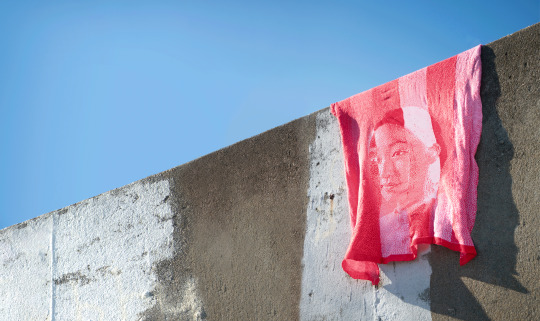
This project explores how Asian multilingual or bilingual individuals switch "codes" (languages) at home and in a professional setting. This publication also goes beyond just switching languages but the shift and change within our personality, traits and values.
This knitted ephemera Sun Ho made for this project states that the process of knitting is quite messy like how immigration was for immgirants. The original knitting machine could only read 24 pixels of information per row but she hacked it, increasing the data capacity to 200 pixels. The hacked machine produces glitches, refusing to "surrender to this new, forced way of existing" – this hints at when we swtich codes, we erase parts of us in order to fit in but those parts never can go away but come back.
The Chronicles of Sameri

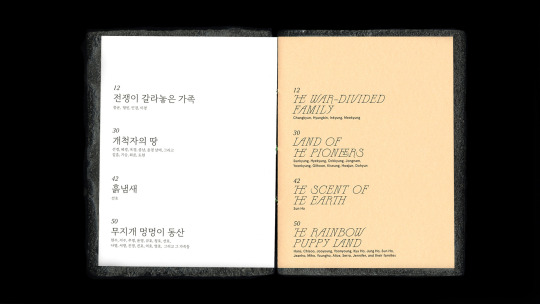
Through materiality and publication Sun Ho emphaszies the fragility of memories through the glass material she uses for the publication, but also the use of rope communicates the strength and durability of her family members. This publication encapsulates the memories of her war-divided family, with hiopes of reuniting them with their children, siblings and parents (some whom they never even got to meet but only know of). Hr grandparents have cultivated a land in the midst of a barren mountain called Sameri and built houses so that following generations could live there, never having to seperate like how the war separated them.
She "wove together" spotty memories of her aunties, uncles pf grandma and grandpa.
Ji Hee Lee
Is a Korean graphics designer that is based in Germany. Recurring themes she explores in her practice are racial inequalities/stereotypes and how Asians/women experience, to draw attention and address these ideas through visual communication.
In her practice, through thorough research and analysing of her work she uses effective copywriting throughout her work. Some of them are more subtle while some of them are more powerful and can come off slightly aggressive – this is also shown through visual design.
Such as this:
Steretypography Posters

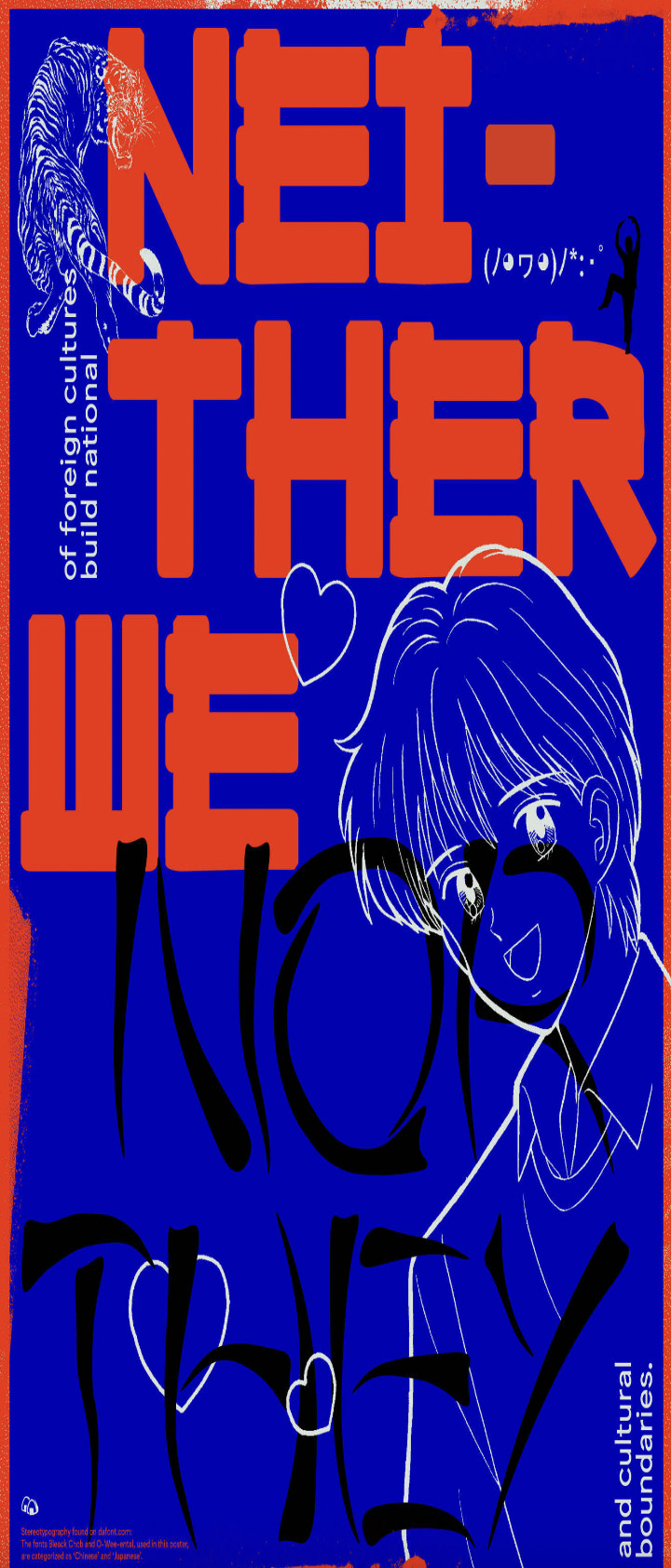

Ji Hee Lee breaks down cultural boundaries built by stereotypes. She explores this idea further by exploring different typefaces and seeking how "western" typefaces are perceived and how "Asian" typefaces are perceived by society. One way she broke this down was by going through a site called "dafont", which is a site for free fonts and there is a section seperate for asian fonts. Ji Hee states “By browsing these typefaces, you can see how ‘Asia’ is perceived to the eye of Westerners,”.
These anime inspired characters, ornamental bamboo sticks and chopsticks that embellish Asian typefaces and fonts come off as pervasive which is also met offline. She used these free fonts from these sites to design a series of posters that reveal how these typefaces have been heavily manipulated to appear "non-Latin" or "non-Western".
Her posters placed side by side fragmentally read: “Stereotypical Representations of foreign cultures build national and cultural boundaries,” and “Those types represent neither us nor you.”
It's interesting to see how this designer has approached her work and the themes and ideas she unpacks through exploration of western and typefaces that try to not appear to be somewhat "Asian". I thought this was an effective and creative way to unpack this idea by exploring how Asia as a whole is perceieved through the eyes of society and western people, when in-fact that is not what represents us.
Poster for Antiracism, 2016

Ji Hee lee continue to reveal the ways racism and stereotyping can become normalized both in visual culture and in society and has been a prominent idea Lee has working on ever since moving to Germany in 2016, as she encountered numerous racial experiences. She found herself sharing her own experiences with another fellow student So Jin Park and they came up with an idea to create a platform where Asians could come up and share their story and heritage, which now directly links to her next project "I Am Angry".
I Am Angry
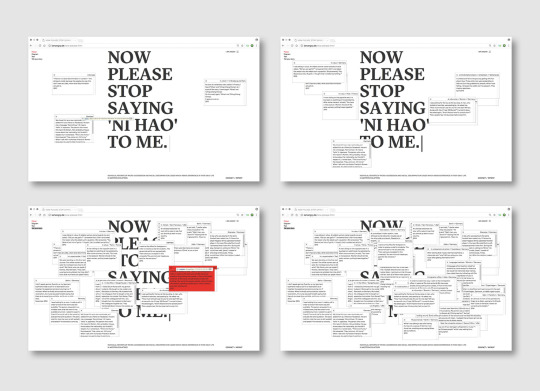
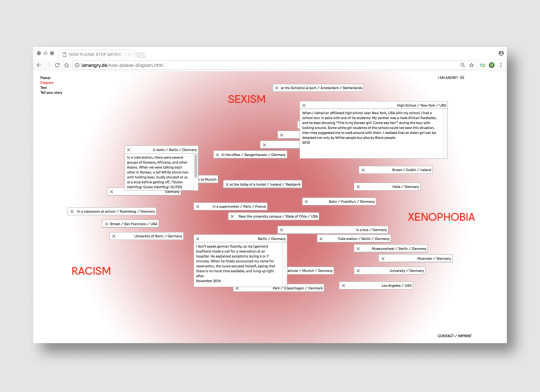

From the platform they created they designed and launched a website "I Am Angry" to house the stories of these people – a website where they hope to continue to empower and help the Asian community find ways to deal with micro-aggression.
The site is divided into 6 sections, with "Now please stop saying Ni Hao to me" being what Lee calls the "heart and soul" of the website. When ou click on the "diagram" section it arranges itself to three sub sections of the page "sexism, xenophobia and racism". Persoanl stories that were recorded are scattered across the page and the ones that are centered are ones that touch on all three sub sections.
These stroies are displayed on pop-up windows and purposely designed to annoy users as they cannot close these windows which reflect the micro-aggressions they experience. Lee states "It’s a metaphor that derives from our everyday encounters: how we have no control over the situation.”
Many of her projects that she works on addresses these issues as these stereotypes and micro-aggressions is what impacts her as a designer and her day-today life, especially ever since moving to Germany. She believes the projects she works on have impact and promotes awareness and also speak against the prejudice, hoping to see gradual change within society.
Celine Dam
Celine Dam is a Vietnamese-Chinese writer and actor from Auckland, New Zealand. She has written several pieces for print, online publications and zines and is grateful to inform others through her unique lens. Through these art forms and practice, she hopes to bring light to more Asian stories within western media.
Pork & Poll Taxes
This is a theatrical play that Celine has starred in.
This play is set in the 1890's which follows a Chinese family in Aotearoa and China with the men looking for gold (Sam Gan Saan) and women staying in the latter. Although it is a fictional play the historical background and roots are rbought to light through this play.
To give some historical background, in the late 19th century many Chinese men sought their way to NZ to make fortunes in the Gold Rush. Migrant workers were brought over from China by the government to work in the Otago minefields. But as employment in mines began to dwindle, anti-Chinese prejudice began to flourish.
In 1881 this sentiment became official with a poll tax of £10 (equivalent to $1770 today) was imposed on Chinese migrants and the number allowed to land from each ship arriving in New Zealand was restricted. Only one Chinese passenger was allowed for every 10 tons of cargo. In 1896 this was changed to one passenger for every 200 tons, and the tax was increased to £100 ($20,000).
For Chinese migrants arriving in New Zealand during the poll tax era, legal discrimination weren't the only obstacle they were faced with – migrants were also met with hostility from New Zealand’s Pākehā population, giving rise to organisations such as the Anti-Chinese Association and the White New Zealand League.
Pork and Poll Taxes touches on many of these issues, exploring themes such as sacrifice, belonging and what it means to be a family, which Pua (director & writer) says she based on two Chinese proverbs: “One says that ‘we grow roots where we land’, which speaks to the Chinese diaspora and this idea that you can build a new life and home somewhere else. And the contrasting proverb is ‘fallen leaves always return home to their roots’, which touches on this idea that you always go back to where you’re from.”
Celine states "last night i claimed back the Chinese culture i'd once so heavily rejected. last night i dedicated my performance to my younger self. how liberating that she was now onstage speaking her mother tongue, claiming a culture she once ran away from. i dedicated that performance to my Chinese mother and all the richness of culture she has gracefully passed onto me. to my ancestors who kept their heads down so that i could lift mine up, and finally to talia pua. thank you for the opportunity to fall back in love with being Chinese."
instagram
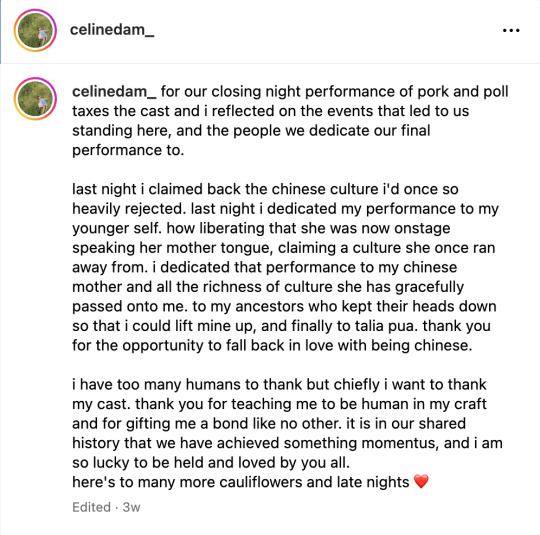
https://thespinoff.co.nz/society/03-08-2021/pork-and-poll-taxes-reclaiming-new-zealands-forgotten-history-on-stage
Dear Mama and Baba: A letter to my Asian Parents about Depression
This is a raw letter to her asian parents about a mental illness that does not cease to "exist" in asian culture and through Celines beautiful writing highlights the issue of depression in Asian culture and how it is an illness where usually it is not accepted or dismissed because older generations of Asians think its due to "lack of effort"and therefore, many concealing their illness. But Celine speaks out on the matter. She puts herself in the fore front so that other Asian's living in NZ can overcome it because the very culture has dismissed the concept of it.
https://thespinoff.co.nz/society/27-09-2020/dear-baba-and-mama-a-letter-to-my-asian-parents-about-my-depression
Grappling With my Chinese Name
Through this written essay Celine highlights a complicated relationship with her Chinese name. At age 12, she gave herself the name Celine, so she could avoid having teachers and peers mangle the name she was given by her parents. In this essay she tries to come to terms with all the ways our society has made her want to hide her name.
https://www.renews.co.nz/grappling-with-my-chinese-name/
In her work and practice she centres her Kiwi-Chinese,Vietnamese identity. In most of her practice, you can see her constant effort in bringing awareness and tackling on issues that she experiences as. Kiwi-Asian and her difficulty of accepting her identity but also takes us on a journey with her as she re-learns a culture she once walked away from.
Although Celines practice and work is very much different to mine, the themes and issues she tackles down with in her work is very similar to mine and the ideas and experiences I have as a Kiwi-Asian myself. I found myself relating to her, especially as Eastern Asian culture is very similar, Chinese and Korean. Many of the issues she brought up in her written pieces, I was able to relate.
Tyrone Ohia
Tyrone Ohia is a Maori designer. In this video Tyrone talks about his approach to his design practice.
He talks about his ancestors – which has rich and deep connections in Maori culture. He states "It was our view of the environment around us – the forest, the sea, the sky, the earth, all of those things. The most important thing is to open your eyes, our ears, and our minds to receive this type of knowledge.".
His guiding principle is to fully understand the Whakapapa and the. foundations of the project so tat he can encompass the history and meaning into his designs that he produces.
I also have similar views on how I start my design as well. When taking on any design jobs I like to have a full deep knowledge of whom and what I am designing for, especially if related to cultural matters.
This can be seen in these designs and project Tyrone worked on:
https://www.aucklandartgallery.com/page/toi-tu-toi-ora-artist-profile-tyrone-ohia
Toi tu Toi Ora
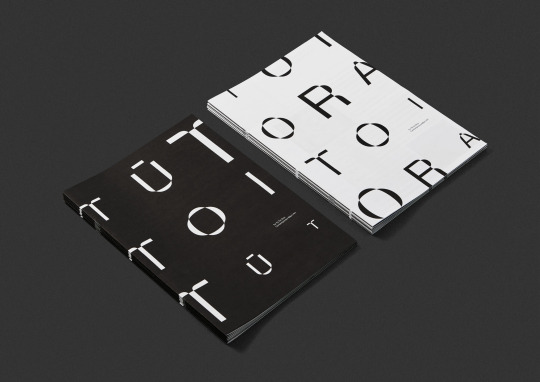
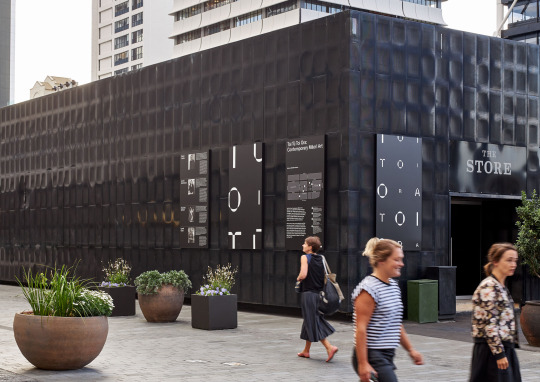
Their approach to designing this identity for the gallery and the satellite exhibition in Britomart was to reflect the unique Maori curatorial framework of the show which is based on the Maori creation narrative. Rather than using the Western chronological order of works they base it on Maori celestial origins.
Basing it on Maori concepts of time and space the shows title forms an interwoven timescape – an infinite ever-changing pattern that spills out of the gallery that draws the viewers into the Maori world. You can see that the words Toi Tu Toi ora repeatedly chants through the gallery space and out into the world, – the words mean "Maori art stands strong and in good health."
The typeface has straight edges, but also warps and bends in mythical ways to reflect the straight lines of Māori woven art forms, and the organic curves of carved art forms.
The shifting between the black and white colour scheme reflects the extremes of the Māori creation narrative – moving from darkness into the world of light, echoing the many dualities within Te Ao
https://bestawards.co.nz/toitanga/toitanga/extended-whanau/toi-tu-toi-ora-contemporary-maori-art-2/
https://concreteplayground.com/auckland/event/toi-tu-toi-ora-contemporary-maori-art
Saul Bass
Seachange Studio
0 notes
Text
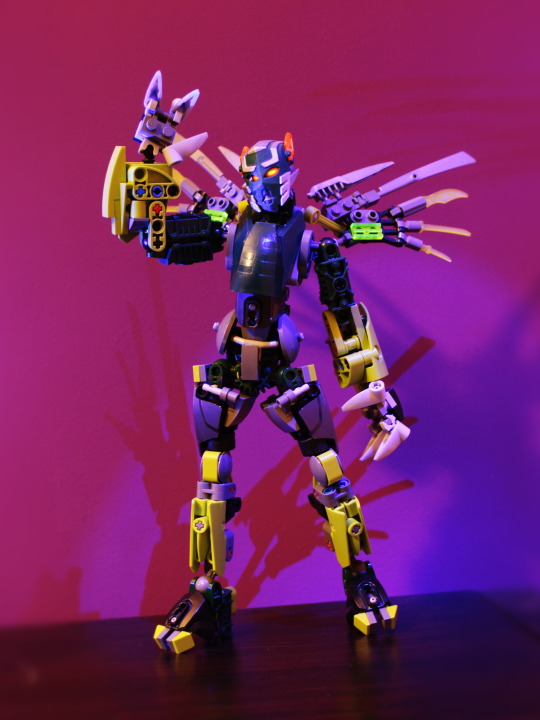



I dug out
the good camera
for a photoshoot whilst I had some blue LEDs set up
63 notes
·
View notes
Photo

My Secret Santa present for @toatom and i guess kinda @sensitivetroll too. Merry Christmas! Glædelig Jul! ^^
27 notes
·
View notes
Conversation
Izuku: You can’t kill me if I kill myself first
Iida: WHAT KIND OF LOGIC IS THAT?!
Todoroki: The worst kind.
#source: sameries-ao3#incorrect quotes#incorrect bnha quotes#incorrect mha quotes#mha#my hero academia#bnha#boku no hero academia#izuku midoriya#midoriya#midoriya izuku#izuku#deku#my post#todoroki shouto#shouto todoroki#todoroki#iida#iida tenya#tenya iida
2K notes
·
View notes
Text
Heero, about Zechs: He can’t kill me if I kill myself.
Relena: What kind of logic is that?!
Duo: The worst kind.
#heero yuy#relena darlian#relena peacecaft#duo maxwell#gundam wing#incorrect quotes#source: sameries-ao3
42 notes
·
View notes
Photo

I heard @toatom and @sensitivetroll have birthdays very close, so here’s belated/early gift art from me of their OCs doing some jojo poses and being all awesome and cool.
Love you both. <3
__________________________________________________________
Do not edit, use, copy or claim as your own. Do not repost to this or other sites unless given explicit written permission. Do not link back to your blog or otherwise use this artwork as a platform to self-plug.
Consider supporting me on [Patreon].
Commission info can be found [here].
35 notes
·
View notes
Text

Esse desenho foi feito do Medibang, eu não usava, NUNCA, só fiz 3 desenhos neles, que eram só rascunhos, e na verdade, achei bem satisfatória fazer esse desenho :v
Só achei algumas coisas bem complicadas, e que dificultam mais o desenho, mas tem coisas que também facilitam bastante, talvez quando eu for fazer desenhos mais sérios eu use ele :v
This drawing was made of Medibang, I don't use it, I NEVER did only 3 drawings in them, which were just sketches, and in fact, I found very satisfactory to make this drawing:v
I only find some things that are very complicated, and that make the drawing more difficult, but there are things that also make it much easier, maybe when I go to make more serious drawings I use it:'v
4 notes
·
View notes
Photo
hot take: I think it is ok to wear a costume of and different race ONLY when: Doing a specific character (accurately) not putting paint on the skin.
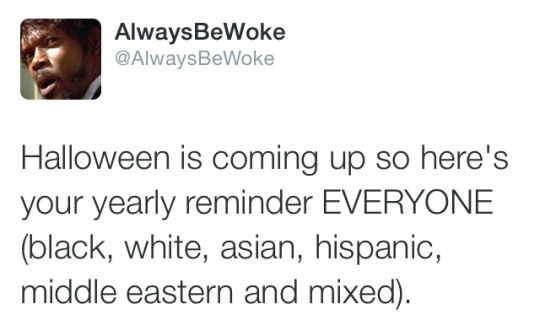
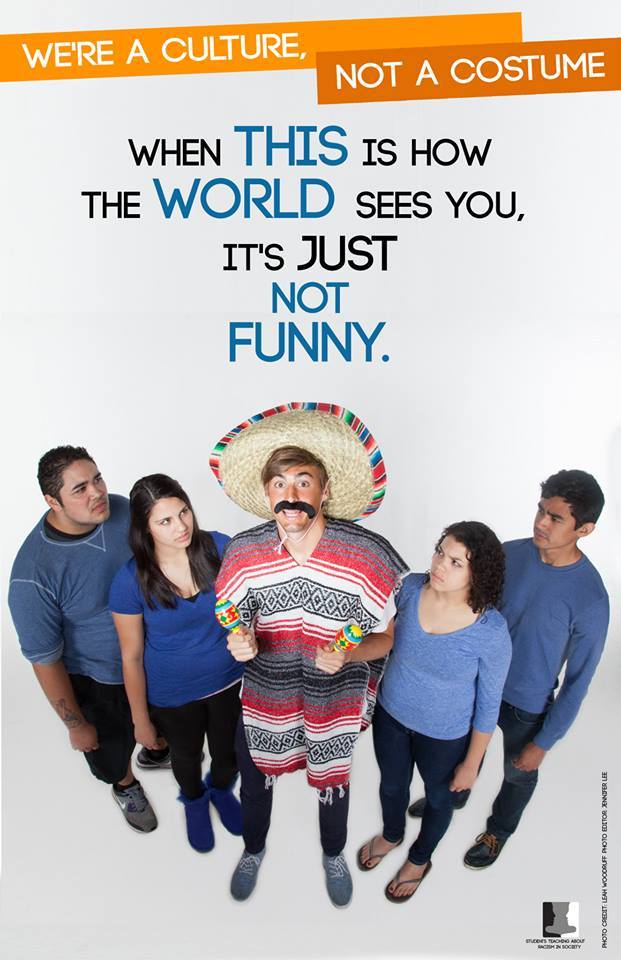
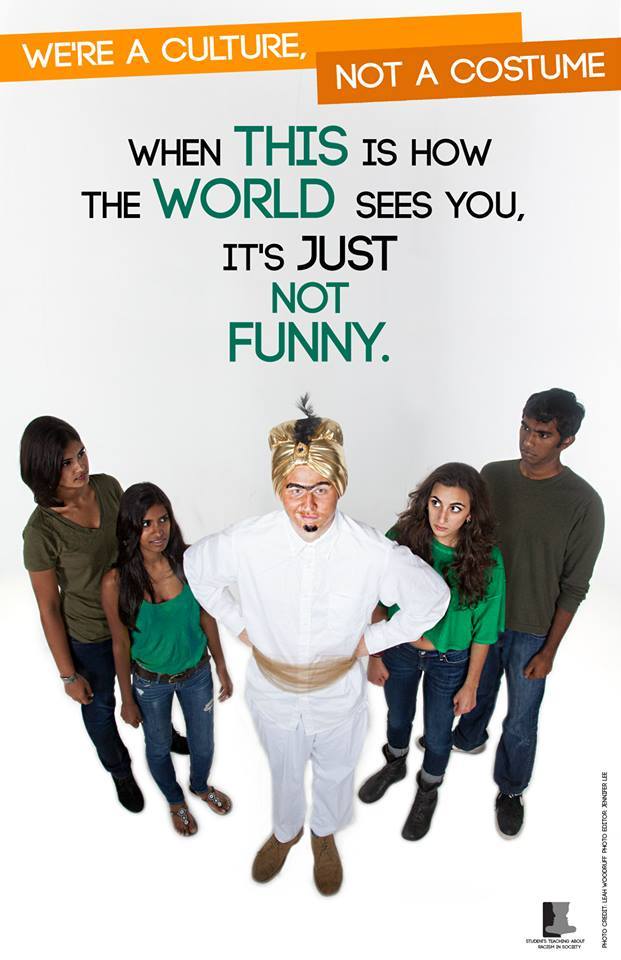
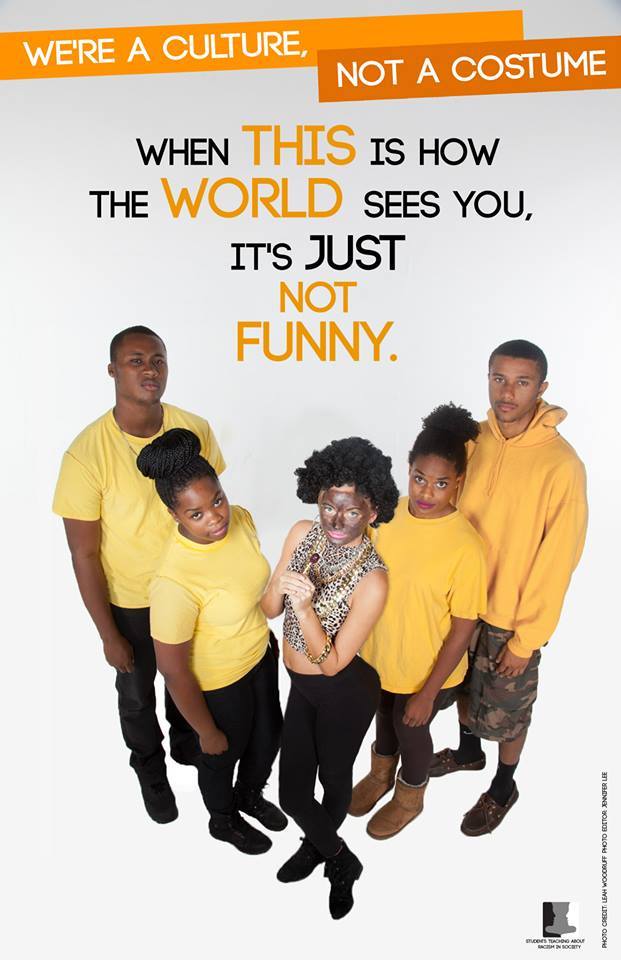
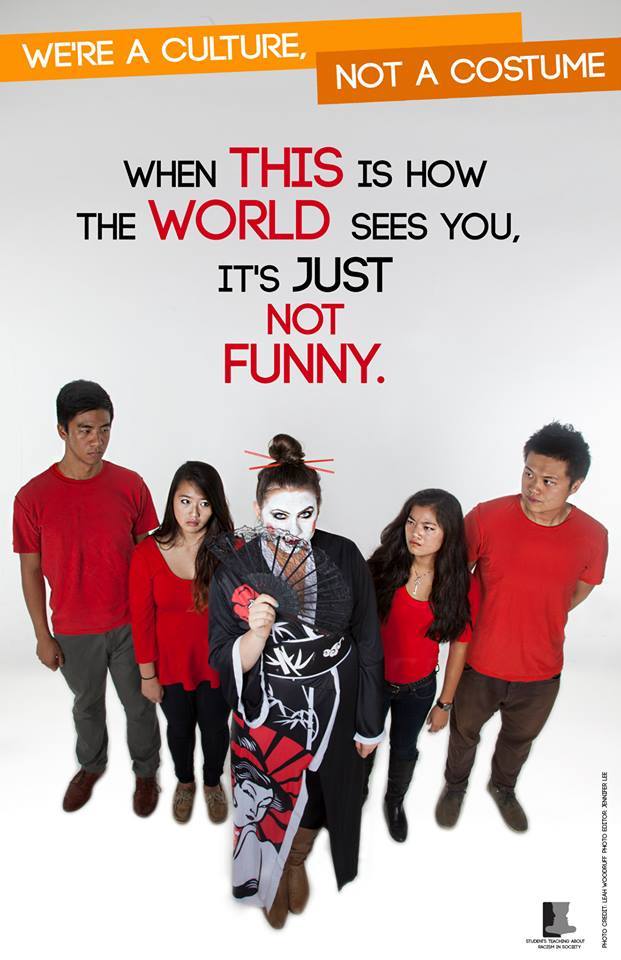
287K notes
·
View notes